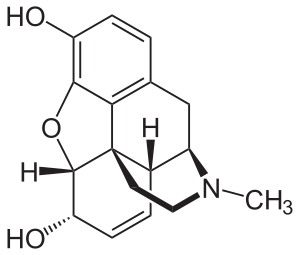Opioid withdrawal
| Opioid use disorder | |
|---|---|
| Synonyms | Opioid addiction and dependence |
 |
|
| Classification and external resources | |
| Specialty | psychiatry |
| ICD-10 | F11.2 |
| ICD-9-CM | 304.0 |
| MeSH | D009293 |
An opioid use disorder is a medical condition that is characterized by the compulsive use of opioids despite adverse consequences from continued use and the development of a withdrawal syndrome when opioid use stops. It involves both an addiction to and dependence upon opioids.
Opioids include substances such as morphine, heroin, codeine, oxycodone, hydrocodone, etc. The necessary descriptive characteristics of the medical diagnosis are a preoccupation with a desire to obtain and take the drug and persistent drug-seeking behavior. The opioid dependence-withdrawal syndrome involves both psychological dependence and marked physical dependence upon opioid compounds.
Opioid use disorders resulted in 51,000 deaths worldwide in 2013, up from 18,000 deaths in 1990.
Symptoms of withdrawal from opiates include, but are not limited to:
Most people who are opioid-dependent have at least one other psychiatric comorbidity. Opioid dependence often develops as a result of self medication. Opioids are excellent acute pain medication, but it is their ability to produce euphoria that makes them attractive to addicts. Scoring systems have been derived to assess the likelihood of opiate addiction in chronic pain patients.
Overexpression of the gene transcription factor "ΔFosB" in the nucleus accumbens plays a crucial role in the development of opioid addiction by directly modulating compulsive drug-seeking behaviors.
Like many other forms of behavioral addiction and drug addiction, overuse of opiates leads to increased ΔFosB expression in the nucleus accumbens. Opiates affect dopamine neurotransmission in the nucleus accumbens through their disinhibition of the GABA-based negative dopaminergic feedback system in the rostromedial tegmental nucleus.
...
Wikipedia
